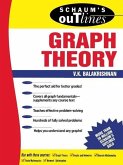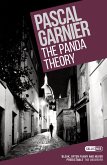- Broschiertes Buch
- Merkliste
- Auf die Merkliste
- Bewerten Bewerten
- Teilen
- Produkt teilen
- Produkterinnerung
- Produkterinnerung
Introducing Communication Theory: Analysis and Application focuses on the links between theory and everyday experiences. This text uses an engaging writing style and a consistent, organized template to present the concept of theory and help students become insightful, critical thinkers. The Connect course for this offering includes SmartBook, an adaptive reading and study experience that guides students to master, recall, and apply key concepts while providing automatically graded assessments.
Andere Kunden interessierten sich auch für
![Grounded Practical Theory: Investigating Communication Problems Grounded Practical Theory: Investigating Communication Problems]() Robert T. CraigGrounded Practical Theory: Investigating Communication Problems102,99 €
Robert T. CraigGrounded Practical Theory: Investigating Communication Problems102,99 €![Practicing Communication Theory: Exploring, Applying, and Teaching the Constitutive Metamodel Practicing Communication Theory: Exploring, Applying, and Teaching the Constitutive Metamodel]() Practicing Communication Theory: Exploring, Applying, and Teaching the Constitutive Metamodel90,99 €
Practicing Communication Theory: Exploring, Applying, and Teaching the Constitutive Metamodel90,99 €![Schaum's Outline of Graph Theory: Including Hundreds of Solved Problems Schaum's Outline of Graph Theory: Including Hundreds of Solved Problems]() V. BalakrishnanSchaum's Outline of Graph Theory: Including Hundreds of Solved Problems27,99 €
V. BalakrishnanSchaum's Outline of Graph Theory: Including Hundreds of Solved Problems27,99 €![Lectures of Sidney Coleman on Quantum Field Theory: Foreword by David Kaiser Lectures of Sidney Coleman on Quantum Field Theory: Foreword by David Kaiser]() Lectures of Sidney Coleman on Quantum Field Theory: Foreword by David Kaiser93,99 €
Lectures of Sidney Coleman on Quantum Field Theory: Foreword by David Kaiser93,99 €![The Panda Theory: Shocking, Hilarious and Poignant Noir The Panda Theory: Shocking, Hilarious and Poignant Noir]() Pascal GarnierThe Panda Theory: Shocking, Hilarious and Poignant Noir14,99 €
Pascal GarnierThe Panda Theory: Shocking, Hilarious and Poignant Noir14,99 €![Lectures Of Sidney Coleman On Quantum Field Theory: Foreword By David Kaiser Lectures Of Sidney Coleman On Quantum Field Theory: Foreword By David Kaiser]() Lectures Of Sidney Coleman On Quantum Field Theory: Foreword By David Kaiser193,99 €
Lectures Of Sidney Coleman On Quantum Field Theory: Foreword By David Kaiser193,99 €![College Introduction to African-centered Theory: Selected Readings in Africana Studies College Introduction to African-centered Theory: Selected Readings in Africana Studies]() College Introduction to African-centered Theory: Selected Readings in Africana Studies104,99 €
College Introduction to African-centered Theory: Selected Readings in Africana Studies104,99 €-
-
-
Introducing Communication Theory: Analysis and Application focuses on the links between theory and everyday experiences. This text uses an engaging writing style and a consistent, organized template to present the concept of theory and help students become insightful, critical thinkers. The Connect course for this offering includes SmartBook, an adaptive reading and study experience that guides students to master, recall, and apply key concepts while providing automatically graded assessments.
Hinweis: Dieser Artikel kann nur an eine deutsche Lieferadresse ausgeliefert werden.
Hinweis: Dieser Artikel kann nur an eine deutsche Lieferadresse ausgeliefert werden.
Produktdetails
- Produktdetails
- Verlag: McGraw-Hill Education
- 7 ed
- Seitenzahl: 608
- Erscheinungstermin: 1. Juli 2020
- Englisch
- Abmessung: 186mm x 231mm x 23mm
- Gewicht: 796g
- ISBN-13: 9781260575538
- ISBN-10: 1260575535
- Artikelnr.: 59817734
- Verlag: McGraw-Hill Education
- 7 ed
- Seitenzahl: 608
- Erscheinungstermin: 1. Juli 2020
- Englisch
- Abmessung: 186mm x 231mm x 23mm
- Gewicht: 796g
- ISBN-13: 9781260575538
- ISBN-10: 1260575535
- Artikelnr.: 59817734
Richard West is a past President of the National Communication Association. He is also Professor in the Department of Communication Studies at Emerson College in Boston. At Emerson, he has served as the Department Chair for several years, as the Acting Director of the Institute for Liberal Arts and Interdisciplinary Studies, and as the Project Director of the Center for Innovation in Teaching and Learning. He is past President of the Eastern Communication Association, where he received the Past Officer's Award and was recognized as a "Distinguished Research Fellow" in the Association. Rich is also the former Director of NCA's Educational Policies Board. Both Illinois State University (B.A./M.A.) and Ohio University (Ph.D.) have recognized him as an Outstanding Alum in Communication Studies. Rich's research has appeared in Communication Education, Communication Studies, Communication Quarterly, Day Care and Early Education, Communication Reports, Journal of Family Communication, among other diverse outlets. He has written extensively in the area of classroom communication and has been recognized as a "Leading Scholar" in Classroom Communication by the Communication Institute for Online Scholarship (CIOS). Rich's principle co-author is Lynn Turner. Together with Lynn, he has co-authored 5 books in multiple editions. He is also co-editor of The Family Communication Sourcebook and the co-editor of the Sage Handbook of Family Communication. In 2014, NCA's Family Communication Division recognized the Sourcebook as its Outstanding Book Award. In addition, Rich has (co) authored dozens of articles and book chapters and is a current member of numerous journal editorial boards. Rich's research has been featured in a number of media outlets including USA Today, Christian Science Monitor, NPR, Toronto Globe & Mail, CNN International, Austin Statesman (TX), among others. When he has some free time, he enjoys working on his 105 year-old summer home in Maine, but privately admits that he would rather hire people than do the work himself!
Introducing Communication Theory: Analysis and Application, 7e
Part 1 Foundations
CHAPTER 1: Thinking About Communication: Definition, Models, and Ethics
CHAPTER 2: Thinking About the Field: Traditions and Contexts
CHAPTER 3: Thinking About Theory, Research, and Paradigms
Part 2 Empirical/Post-Positivist Theories
The Self and Messages
CHAPTER 4: Expectancy Violations Theory
Relationship Development
CHAPTER 5: Uncertainty Reduction Theory
CHAPTER 6: Social Exchange Theory
CHAPTER 7: Social Penetration Theory
CHAPTER 8: Social Information Processing Theory
Groups, Teams, and Organizations
CHAPTER 9: Structuration Theory
CHAPTER 10: Organizational Information Theory
The Media
CHAPTER 11: Agenda Setting Theory
CHAPTER 12: Spiral of Silence Theory
CHAPTER 13: Uses and Gratifications Theory
Culture and Diversity
CHAPTER 14: Face-Negotiation Theory
Part 3 Interpretive Theories
The Self and Messages
CHAPTER 15: Symbolic Interaction Theory
CHAPTER 16: Coordinated Management of Meaning
Relationship Development
CHAPTER 17: Communication Privacy Management Theory
Groups, Teams, and Organizations
CHAPTER 18: Groupthink
CHAPTER 19: Organizational Culture Theory
The Public
CHAPTER 20: The Rhetoric
CHAPTER 21: Dramatism
CHAPTER 22: The Narrative Paradigm
The Media
CHAPTER 23: Media Ecology Theory
Culture and Diversity
CHAPTER 24: Communication Accommodation Theory
Part 4 Critical Theories
Relationship Development
CHAPTER 25: Relational Dialectics Theory
The Media
CHAPTER 26: Cultivation Theory
CHAPTER 27: Cultural Studies Theory
Culture and Diversity
CHAPTER 28: Muted Group Theory
CHAPTER 29: Feminist Standpoint Theory
CHAPTER 30: Co-Cultural Theory
Part 1 Foundations
CHAPTER 1: Thinking About Communication: Definition, Models, and Ethics
CHAPTER 2: Thinking About the Field: Traditions and Contexts
CHAPTER 3: Thinking About Theory, Research, and Paradigms
Part 2 Empirical/Post-Positivist Theories
The Self and Messages
CHAPTER 4: Expectancy Violations Theory
Relationship Development
CHAPTER 5: Uncertainty Reduction Theory
CHAPTER 6: Social Exchange Theory
CHAPTER 7: Social Penetration Theory
CHAPTER 8: Social Information Processing Theory
Groups, Teams, and Organizations
CHAPTER 9: Structuration Theory
CHAPTER 10: Organizational Information Theory
The Media
CHAPTER 11: Agenda Setting Theory
CHAPTER 12: Spiral of Silence Theory
CHAPTER 13: Uses and Gratifications Theory
Culture and Diversity
CHAPTER 14: Face-Negotiation Theory
Part 3 Interpretive Theories
The Self and Messages
CHAPTER 15: Symbolic Interaction Theory
CHAPTER 16: Coordinated Management of Meaning
Relationship Development
CHAPTER 17: Communication Privacy Management Theory
Groups, Teams, and Organizations
CHAPTER 18: Groupthink
CHAPTER 19: Organizational Culture Theory
The Public
CHAPTER 20: The Rhetoric
CHAPTER 21: Dramatism
CHAPTER 22: The Narrative Paradigm
The Media
CHAPTER 23: Media Ecology Theory
Culture and Diversity
CHAPTER 24: Communication Accommodation Theory
Part 4 Critical Theories
Relationship Development
CHAPTER 25: Relational Dialectics Theory
The Media
CHAPTER 26: Cultivation Theory
CHAPTER 27: Cultural Studies Theory
Culture and Diversity
CHAPTER 28: Muted Group Theory
CHAPTER 29: Feminist Standpoint Theory
CHAPTER 30: Co-Cultural Theory
Introducing Communication Theory: Analysis and Application, 7e
Part 1 Foundations
CHAPTER 1: Thinking About Communication: Definition, Models, and Ethics
CHAPTER 2: Thinking About the Field: Traditions and Contexts
CHAPTER 3: Thinking About Theory, Research, and Paradigms
Part 2 Empirical/Post-Positivist Theories
The Self and Messages
CHAPTER 4: Expectancy Violations Theory
Relationship Development
CHAPTER 5: Uncertainty Reduction Theory
CHAPTER 6: Social Exchange Theory
CHAPTER 7: Social Penetration Theory
CHAPTER 8: Social Information Processing Theory
Groups, Teams, and Organizations
CHAPTER 9: Structuration Theory
CHAPTER 10: Organizational Information Theory
The Media
CHAPTER 11: Agenda Setting Theory
CHAPTER 12: Spiral of Silence Theory
CHAPTER 13: Uses and Gratifications Theory
Culture and Diversity
CHAPTER 14: Face-Negotiation Theory
Part 3 Interpretive Theories
The Self and Messages
CHAPTER 15: Symbolic Interaction Theory
CHAPTER 16: Coordinated Management of Meaning
Relationship Development
CHAPTER 17: Communication Privacy Management Theory
Groups, Teams, and Organizations
CHAPTER 18: Groupthink
CHAPTER 19: Organizational Culture Theory
The Public
CHAPTER 20: The Rhetoric
CHAPTER 21: Dramatism
CHAPTER 22: The Narrative Paradigm
The Media
CHAPTER 23: Media Ecology Theory
Culture and Diversity
CHAPTER 24: Communication Accommodation Theory
Part 4 Critical Theories
Relationship Development
CHAPTER 25: Relational Dialectics Theory
The Media
CHAPTER 26: Cultivation Theory
CHAPTER 27: Cultural Studies Theory
Culture and Diversity
CHAPTER 28: Muted Group Theory
CHAPTER 29: Feminist Standpoint Theory
CHAPTER 30: Co-Cultural Theory
Part 1 Foundations
CHAPTER 1: Thinking About Communication: Definition, Models, and Ethics
CHAPTER 2: Thinking About the Field: Traditions and Contexts
CHAPTER 3: Thinking About Theory, Research, and Paradigms
Part 2 Empirical/Post-Positivist Theories
The Self and Messages
CHAPTER 4: Expectancy Violations Theory
Relationship Development
CHAPTER 5: Uncertainty Reduction Theory
CHAPTER 6: Social Exchange Theory
CHAPTER 7: Social Penetration Theory
CHAPTER 8: Social Information Processing Theory
Groups, Teams, and Organizations
CHAPTER 9: Structuration Theory
CHAPTER 10: Organizational Information Theory
The Media
CHAPTER 11: Agenda Setting Theory
CHAPTER 12: Spiral of Silence Theory
CHAPTER 13: Uses and Gratifications Theory
Culture and Diversity
CHAPTER 14: Face-Negotiation Theory
Part 3 Interpretive Theories
The Self and Messages
CHAPTER 15: Symbolic Interaction Theory
CHAPTER 16: Coordinated Management of Meaning
Relationship Development
CHAPTER 17: Communication Privacy Management Theory
Groups, Teams, and Organizations
CHAPTER 18: Groupthink
CHAPTER 19: Organizational Culture Theory
The Public
CHAPTER 20: The Rhetoric
CHAPTER 21: Dramatism
CHAPTER 22: The Narrative Paradigm
The Media
CHAPTER 23: Media Ecology Theory
Culture and Diversity
CHAPTER 24: Communication Accommodation Theory
Part 4 Critical Theories
Relationship Development
CHAPTER 25: Relational Dialectics Theory
The Media
CHAPTER 26: Cultivation Theory
CHAPTER 27: Cultural Studies Theory
Culture and Diversity
CHAPTER 28: Muted Group Theory
CHAPTER 29: Feminist Standpoint Theory
CHAPTER 30: Co-Cultural Theory








